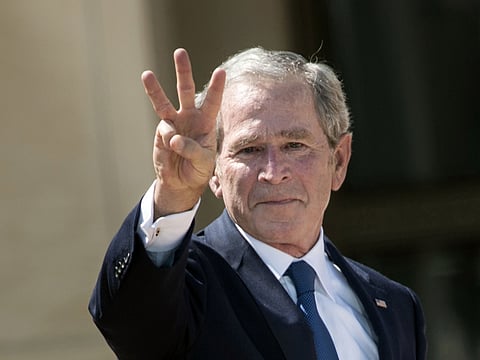When US soft-power is left unutilised
The new Iraq is not more stable and safer than it was at any time before and all during the years following the occupation

The war on Daesh (the self-proclaimed Islamic State of Iraq and the Levant) in Iraq has resulted in the decline of America’s political role in pinpointing paths of events in that country. The statements issued by some Iraqi politicians have become louder with more of an edge in criticising and degrading the US’s role in fighting the terrorist organisation.
In this context, many questions about the feasibility of the strategy utilised in the fight against terrorism and the extent of the expected success applying it are raised, especially after US officials declared that 75 per cent of the air raids against Daesh return without carrying out their mission.
Let us go back a few years, to the sidelines of the 2003 Davos Forum in Switzerland after the US invasion of Iraq. George Carey, the former Archbishop of Canterbury, asked the then US secretary of state Colin Powell: “Why does the US focus on the use of hard power instead of soft power?”
Powell replied: “The US needed its solid strength to win the Second World War, but it did not use this force to impose its influence in any European country, but proceeded to use its soft power later to rebuild Europe through the Marshall Plan and this is what we did in Japan as well.”
It may be useful to test the validity of Powell’s point of view in Iraq’s case, especially as he was one of this invasion’s pioneers when he spoke before the UN Security Council reasoning the invasion with excuses that turned out to be lame later on. Iraq was occupied during the hysterical wave that gripped US political circles in the wake of the September 11, 2001, terrorist attacks. The US was unable or unwilling to apply its soft power in Iraq, as it did in Europe and Japan after the end of the Second World War because of the great difference between the two situations in terms of time, location and reason. The US did not resort to lending a helping hand to Europe voluntarily as claimed by Powell. Instead, it was motivated by security reasons and concern for its interests.
It announced the Marshall Plan to rebuild Europe in June 1947, while in reality, the war ended in May 1945. The US resorted to utilising and applying the said plan when the deteriorating situation in Germany threatened the possibility of its fall into the hands of the socialist camp, the influence and expansion of which was feared by Washington.
Matters in Iraq were entirely different. The Cold War had ended and the US did not fear that Iraq would fall into the pits of another state’s grip. Daesh was born later, as a result of the US invasion.
Despite the fact that US politicians ignore to link their invasion of Iraq and the birth of Daesh, US President Barack Obama has acknowledged this explicitly when he told the Weiss website on March 18 that “Daesh is the direct fruit of Al Qaida in Iraq, which emerged from our invading the country; thus the organisation is an example of the unintended consequences of the war”.
When the US toppled the former Iraqi regime, large numbers of those considered to be the foes of America were eliminated and were victims of the invasion. Those victims possibly included groups that were ready to get involved with terrorist organisations. However, the US was not able to claim that getting rid of all those groups reduced the risk of terrorism because it lacked a sound vision for the post-Saddam era in Iraq in what was a very complex country — socially, culturally and politically.
Opting for the hard-power option was former US president George W. Bush’s policy that was met with some objection within the Republican Party. These objections were noticeable in stands such as the one adopted by Newt Gingrich, the prominent Republican Representative, when he wondered about the president’s policy in Iraq, saying: “The real key is not in the number of enemies I kill, but in the number of allies I win over.”
So has the US gained new allies as a result of its invasion of Iraq? And has it used its soft power, as it had used in Germany and Japan, in rebuilding Iraq?
The answer to that is certainly ‘No’. In fact, the opposite is true. America’s strategic allies in the region have become wary in terms of security since the invasion as a result of US policies that may have been aimed to undermine the regional system and its established balances. One can actually go a step further and say that America’s new allies in Iraq, who came to power through the US invasion of the country, cannot stand the US anymore and cannot endure its existence on Iraqi soil!
The political blend sponsored by the US in Iraq since the fall of the former regime failed to enhance America’s military achievements. Hence, terrorism in Iraq is not any weaker now than what it was before the invasion and the ‘new’ Iraq is neither more stable nor safer than what it was at any time before or after the US occupation.
Mohammad Akef Jamal is an Iraqi writer based in Dubai.
Sign up for the Daily Briefing
Get the latest news and updates straight to your inbox


